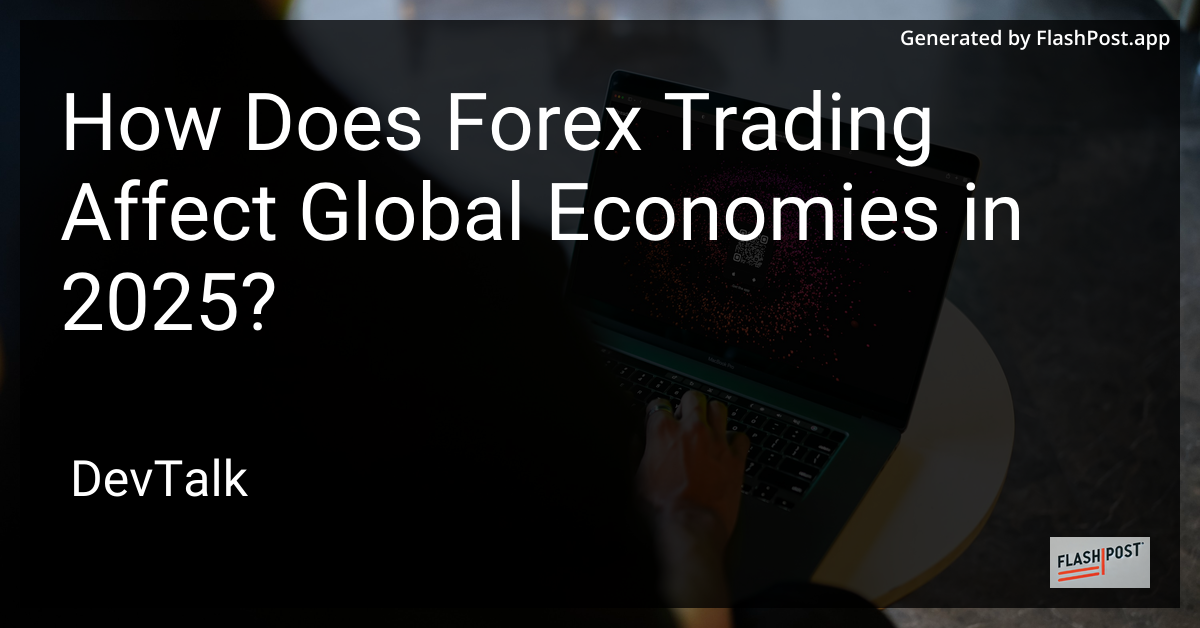How Does Forex Trading Affect Global Economies in 2025?

How Does Forex Trading Affect Global Economies in 2025?
The global forex market, with its staggering daily trading volume surpassing $6 trillion, plays a pivotal role in shaping the economic landscapes of nations worldwide.
As we look into 2025, forex trading's impact on global economies becomes increasingly significant, influencing everything from inflation to economic stability. This article delves into the nuances of forex trading and its profound effects on international economic dynamics.
Forex Trading's Influence on Economic Stability
Exchange Rates and Economic Performance
Exchange rates, determined significantly by forex trading, are a fundamental economic variable. They directly impact export competitiveness, import costs, and ultimately, the trade balance of a country. A robust national currency can make a country's exports more expensive, impacting trade surpluses negatively. Conversely, a weaker currency often results in trade advantages by making exports cheaper and imports more expensive.
Inflation and Monetary Policies
Central banks monitor forex markets closely to implement effective monetary policies. For instance, drastic currency fluctuations can lead to changes in inflation rates. Central banks might adjust interest rates or intervene in forex markets to stabilize their currency and control inflation. Such interventions, expected to be more prevalent in 2025 due to heightened market volatility, influence global economic stability.
Discover how much money you need to start in forex trading here.
Forex Trading and Economic Growth
Impact on Investment and Trade
Forex trading provides liquidity and access to capital, fostering economic growth. It encourages international trade by allowing companies to hedge against currency fluctuations, protecting revenues from adverse rate changes. A stable forex environment encourages foreign direct investment, vital for economic expansion.
Risks of Speculation
Speculative activities in the forex market can pose risks to economies. While speculation provides liquidity, excessive speculative pressure can lead to currency misalignments, affecting economic stability. The increased participation of individuals and non-government entities in forex trading by 2025 is expected to heighten both risks and opportunities within global economies.
Learn about implementing a carry trade strategy in forex here.
The Future of Forex Trading and Economies in 2025
Technological Advancements
Advancements in technology, such as AI and blockchain, continue to revolutionize forex trading. By 2025, these technologies are expected to enhance market efficiency and transparency, reducing transaction costs, and improving regulation frameworks. Such progress will likely bolster the benefits that forex trading brings to global economies.
Geopolitical Influences
Geopolitical events and developments can have substantial impacts on forex markets and, in turn, on global economies. The interconnectedness of global markets means that political instability or policy changes in one region can impact currency values worldwide. Understanding these dynamics is crucial for assessing forex trading's impact on economies in 2025.
Explore how geopolitical events impact forex trading here.
Conclusion
In 2025, the interplay between forex trading and global economies will be more intricate and influential than ever before. Forex markets will continue to shape economic policies, trade balances, and investment strategies across nations. As such, understanding and navigating these markets will remain essential for policymakers, investors, and businesses aiming to thrive in an increasingly interconnected world.
By acknowledging the power of forex trading in shaping economic outcomes, stakeholders can better prepare for the challenges and opportunities that lie ahead. The continuous evolution of forex trading dynamics will undeniably play a significant role in steering global economic trends in 2025 and beyond.